Guide to Wooden Windows in the 21st Century
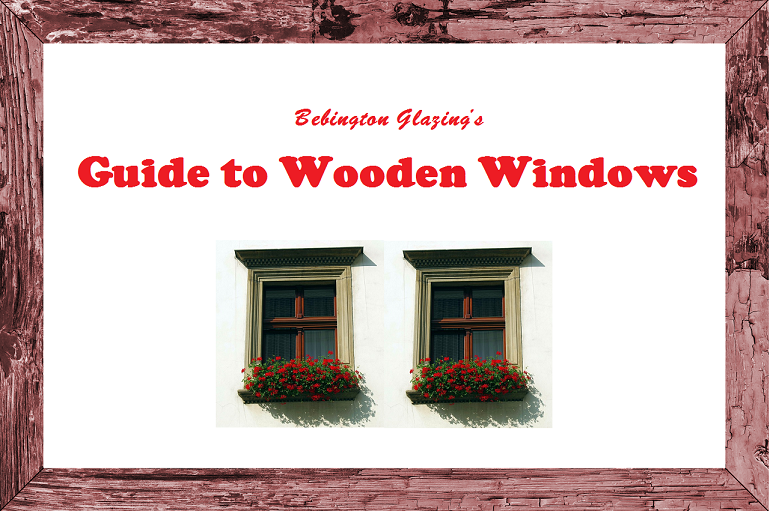
In this guide, we offer you information on getting the best from hardwood and timber windows. Over the last decade, we've seen a revolution in the way wooden windows are produced. Today, you should expect to benefit from excellent factory finishing, enhanced security and an extended warranty from your wooden windows. This was not the norm a few years ago, but it certainly is today!
Some of the benefits you should expect from wooden windows include:
- Energy efficiency ratings with High-A ratings and low U-values
- Wood sourced from sustainable outlets (A+ rating in the BRE Green Guide)
- Repairable
- Extended warranty on finished, glass, service life (around 60 years) and hardwearing
- Carbon negative frames
The benefit of sustainability
Any discuss on wooden windows would be incomplete if it didn't mention sustainability. Wood is obviously natural and completely sustainable. In fact, it's the sole source of naturally renewable building materials available today.
At least in Europe, there exist laws requiring lumber companies to replace trees that are cut down for manufacturing purposes. This has meant that European forests are actually growing at a rate of 661,000 ha each year.
At Bebington Glazing, we supply wooden windows that are completely sustainable, and we obtain certificates to prove this fact. We guarantee that trees used to build our wooden windows are replaced with new trees.
We also obtain a 'Chain of Custody' certification. This proves wood taken from forests is shipped directly to manufacturers and then to retailers, without falling into the hands of any intermediaries who may disregard sustainability laws.
Trees are highly efficient at absorbing carbon dioxide into the atmosphere. The process where trees absorb carbon dioxide from the environment is known as the 'carbon sink' effect. When trees reach maturity, their ability to carry out carbon sink is diminished. At around the age of 80, trees begin to decay. Methane is then emitted into the atmosphere by ageing trees.
When trees reach this age, they are ripe for harvesting. At Bebington Glazing, we are committed to sourcing wood from aged trees that are no longer able to efficiently absorb carbon dioxide from the environment.
The land is freed up to plant new trees that are more efficient at absorbing carbon dioxide. Thus, sustainable forest management actually helps to protect the environment by improving carbon sink.
This science has caused some to describe wood products as being 'carbon negative'. Investing in wooden windows actually means that you are helping to improve the environment, rather than hurt it.
Wooden windows and the environment
On Life Cycle Assessment (LCA) studies, windows score A+. In BRE's Climate Change indicator, wooden windows score A+. This is particularly impressive, given that all other window materials are rated D.
If you maintain your windows, you will prolong the life of your windows. This further improves the carbon store effect of wooden windows. When you come to replace your windows, you should then donate the wood to an organisation that's able to use the wood for biomass fuel.
The below table outlines the BR rating for each building material used for window frames:
| Material | Climate change (BRE GG rating) | Overall rating |
| Softwood | A+ | A+ |
| Hardwood | A+ | A+ |
| PVC+U | D | A |
| Aluminium - powder coated | D | B |
| Steel | D | B |
| Aluminium - composite | C | B |
Performance of wooden windows
We now outline the performance properties of wooden windows we supply. We outline the performance of wooden windows from four different angles. These four angles are outlined below:
1) Thermal performance
Wooden windows must be energy efficient under the Building Regulations. These Regulations apply to both commercial and domestic properties. To meet these requirements, the wooden windows we supply house double or triple glazed glass panels. Furthermore, our wooden windows are sealed. This means our wooden windows are waterproof.
When you invest in wooden windows, we generally advise you to opt for triple glazing. Why? Because of wood's strength, it's much more practical to opt for triple glazing when compared to other materials.
We also replace the air between glass panels with argon or krypton. This further improves the thermal properties of your newly installed wooden windows.
Many people assume that wood will not score as highly as PVC-U when it comes to thermal performance. However, ISO 10077-2:2003 is clear when it states that there is no difference between the thermal properties of PVC-U and wood when double or triple glazing is installed.
2) Weather performance
Due to climate change we've experienced in recent years, the need for high performing wooden windows from a weather perspective has never been so apparent.
BS 6375 sets out the standards for the performances of windows from a weather perspective. All windows we supply are designed to meet the criteria set out in BS 6375.
3) Security performance
Wooden windows we supply are fitted with ground floor window locks. This is particularly important since many home insurance policy will not pay out if ground floor windows are not fitted with locks.
Optionally, we may also install wooden windows and doors with laminated glass. This further improves the security of wooden windows. All of our wooden windows meet the criteria set out in BS: 7950:1997. This British Standard sets out criteria for enhanced security performance for fully reversible and vertical sash windows.
4) Acoustic performance
Under the Building Regulations, windows must be designed to prevent the passage of noise from leaving and entering the property. The regulations also apply to the refurbishment of existing properties.
At Bebington Glazing, our wooden windows are designed to cut down on noise pollution. To ensure your windows block out and retain the maximum amount of noise, we offer triple glazing and secondary glazing options for all the wooden windows we supply.
Generally, single and even double glazing are not effective when it comes to sound insulation. If sound insulation is important, we advise our customers to invest in triple glazing or 'double windows'.
Types of wooden windows
Now we shall briefly discuss window types. 'Types' generally refer to the manner in which windows open. The type of window you invest in generally impacts the overall look of your building. It's thus essential to carefully examine the various options available to you when considering which 'window type' to invest in.
We now outline five common types of wooden windows we supply:
Casement windows
Casement windows open externally. Casement windows are thus a type of 'outward opening' windows. Due to wind pressure from the outside, the window 'sash' is forced tighter to the weather gaskets. This gives casement windows an inherent advantage when it comes to weather performance.
We now outline common forms of casement windows
A) Side hung casement windows
Side hung casement windows are the most common type of window in the United Kingdom today, particularly in domestic properties. Side hung casement windows are either hung directly from the side of the sash, or from the top and bottom of the sash for easy cleaning:
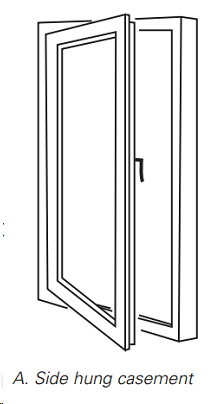
B) Projecting top hung casement windows
These are also known as 'reversible windows'. This variety of casement windows is common in apartment blocks. This is because the design of these windows aids the cleaning process. The windows are designed to allow the outer window to be fully reversed into the building:.
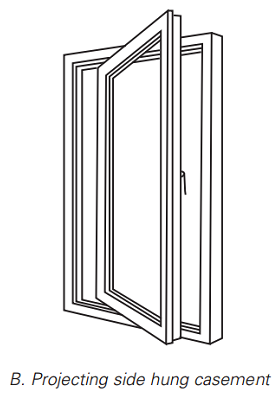
C) Tilt and turn windows
Tilt and turn windows also allows cleaning from the inside. However, unlike 'top hung' casement windows (see above), tilt and turn windows have the principal disadvantage that they will generally interfere with curtains and blinds fitted around the window:
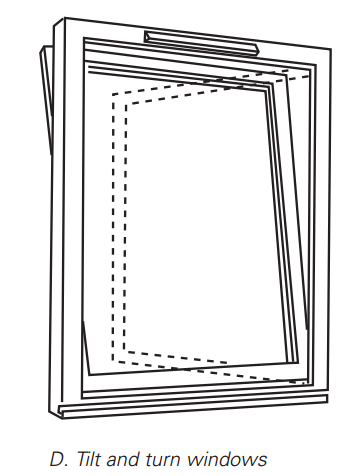
D) Pivot hung windows
Pivot hung windows are predominantly reserved for foot windows. The mechanism allows the sash to turn 180 degrees around the frame:
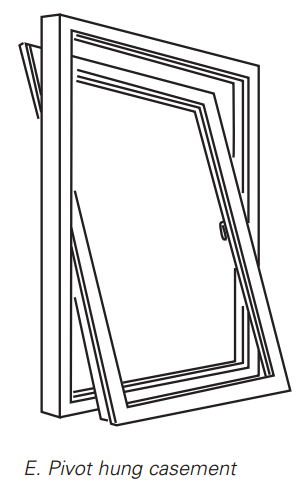
E) Vertical sliding sash windows
This classic type of sash window was popular throughout the nineteenth century. The window slides vertically to open and close. Today, this type of sash window is common for listed buildings that wish to retain their Victorian look about them:
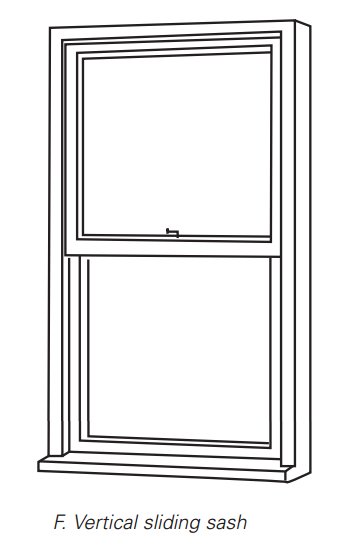
Softwood windows
Although there exist more than 100,000 species of tree, tree species are generally divided into softwoods and hardwoods.
Softwood trees are predominately evergreen and cone-bearing, whilst hardwood trees shed their leaves during the winter or dry season. Softwood is far more common in Europe. For this reason, more than 90% of wooden products sold in the United Kingdom are made from softwood.
At Bebington Glazing, we offer wooden windows made from softwood (redwood) sourced from Scandinavia. When it comes to windows, softwood provides all the benefits you would derive from hardwood but for a fraction of the cost.
Hardwood windows are generally more durable and longer living than softwood windows, however, our softwood windows are treated to ensure their lifespan may be guaranteed for an extended period.
Scandinavian softwood is superior to British 'home grown' softwood. This is because Scandinavian softwood is slower grown than the British variety. UK softwood is more commonly used for products where quality is not too important. This includes wooden pallets, fencing and panel boards.
Hardwood windows
Hardwood windows are highly durable and incredibly strong. Hardwood windows are highly decorative thanks to their deep colour. At Bebington Glazing, we supply hardwood windows from 'temperate hardwoods' grown in Europe. These include birch, oak and beech. This ensures our hardwood is sourced from sustainable forests.
Temperate hardwoods are commonly grown in Europe, North Africa, North America and New Zealand. Tropical hardwoods are grown in Africa, Asia and South America. Examples of tropical hardwood include idigbo, iroko, red iouro, mahogany, meranti, sapele, utile and teak.

Comments
No Comments
Add a comment